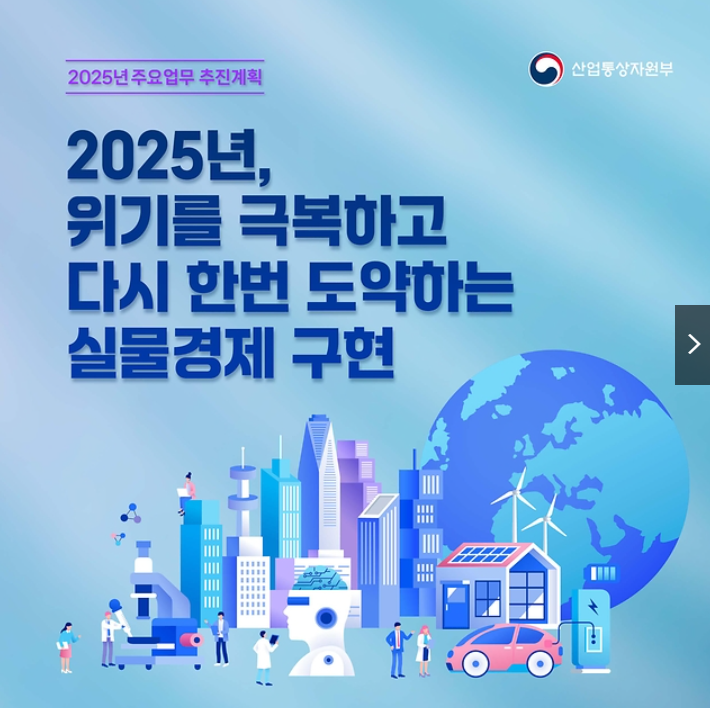The Korean Ministry of Trade, Industry, and Energy (MOTIE) has announced its 2025 strategic plans, focusing on addressing economic challenges, strengthening industrial competitiveness, and fostering innovative growth sectors. Here’s a detailed look at how these policies are shaping South Korea’s industrial and trade landscape.

1. Proactive Response to a Rapidly Changing Global Trade Environment
To mitigate risks in a volatile global trade environment, MOTIE is implementing coordinated strategies with government and private sectors.
Key Initiatives:
- Integrated Response Framework: Regular high-level discussions under the "National Economic Issues Roundtable."
- Strategic Cooperation: Forming a government task force to support Korea-U.S. collaboration in shipbuilding.
- Enhanced Trade Remedies: Upgrading anti-dumping investigations and introducing anti-circumvention measures to protect domestic industries.
These measures are expected to provide a safety net for industries vulnerable to unfair trade practices while positioning Korea as a global trade leader.
2. Sustaining Export and Foreign Investment Momentum
South Korea aims to maintain its upward export trend and attract significant foreign direct investment (FDI).
Policies for Export Growth:
- Expanded Trade Insurance: A record KRW 252 trillion in trade insurance and KRW 1.5 trillion in exchange rate risk coverage.
- Enhanced Logistics Support: Introduction of specialized logistics vouchers.
- Aggressive Marketing: Hosting 305 exhibitions and sending 12 trade delegations globally.
FDI Goals:
- Incentives Boost: Cash support increased to 75%, and tariff exemptions extended to 12 years.
- Global Outreach: Targeting KRW 350 billion in FDI through summits like APEC CEO meetings and "Invest Korea Summits."
3. Reinventing Traditional Industries for Global Competitiveness
MOTIE is addressing structural weaknesses in major industries while preparing them for the future.
Industrial Upgrades:
- Semiconductors: Launching a mega-cluster and finalizing the "Semiconductor Special Law."
- Eco-friendly Vehicles and Batteries: Strategies to strengthen green vehicle competitiveness.
- Shipbuilding: Policies to develop post-LNG carrier core industries.
These initiatives aim to bolster South Korea’s dominance in key industries while adapting to global market demands.
4. Pioneering New Growth Engines and Industrial Innovation
South Korea is doubling down on technologies that will define the future.
Innovation Focus:
- AI-Driven Transformation: Expanding AI projects to 60 additional industrial sites.
- Advanced Robotics: Investing in humanoid R&D and establishing a KRW 200 billion testing infrastructure.
- Biotechnology: Launching a national bio-foundry and achieving localization of 80 critical materials for biotech manufacturing.
5. Meeting Energy and Sustainability Goals
The ministry aims to ensure stable energy supply, promote carbon neutrality, and manage energy safety.
Renewable and Nuclear Energy:
- Nuclear Power: Investing KRW 3.5 trillion in the sector by 2025 and initiating SMR (Small Modular Reactor) development.
- Green Energy: Strengthening solar energy supply chains and enacting the Hydrogen Business Act.
Safety and Security:
- Energy Safety Plan: Conducting nationwide inspections on 198 hydrogen charging stations and establishing comprehensive safety protocols for electricity and gas management.
2025: A Year of Opportunities Amid Challenges
MOTIE’s comprehensive plan underscores South Korea’s determination to lead in industrial innovation, economic resilience, and sustainable energy. By balancing traditional strengths with cutting-edge advancements, the ministry is positioning the nation for success on the global stage.



